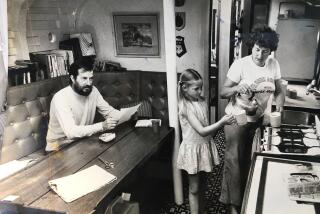‘Shore’ is a water world of love, war and loss
- Share via
Islands have often proved fertile ground for fiction. From Prospero’s conjured dreamscape to the allegoric atoll of “Lord of the Flies,” remote shores can be ideal test sites for the vagaries of human behavior. Utopian, dystopian, fantastic or mundane, they rise from the sea less as landmasses than as literary metaphors. Yet the island in Paul Yoon’s “Once the Shore” manages to be both: a rich, fully realized place and a common thread that links its residents through history and time.
The eight stories in this graceful, haunting first collection span 50-odd years from the time just after World War II to the present. Solla Island, off the southernmost tip of South Korea, is something of a Pacific idyll: Dense citrus groves abound, “sea women” dive for fish and snow blankets the camphor trees in winter. Still, a lasting sadness born of loss -- sudden or gradual, known or unacknowledged -- plagues all of the characters in these gem-like tales. Parents search in vain for their son, half-knowing he is already gone. A vanished childhood playmate reappears only to slip away again. Love is cut short or unrequited. Time passes, and is lost.
In the quiet but searing “Faces to the Fire,” Sojin runs a convenience store on the western side of Solla, caring for her ailing father in the evenings. Like most of the other women in Yoon’s stories, she has grown older almost by accident and now finds herself alone: “A year turned into another, the seasons repeating. She turned twenty, then twenty-five. She opened the store. . . . She spent the evenings at home.” The unremarked routine of her life jolts from its course when a local boy she’d known long ago returns. Yoon casts her slowly building thrill at his presence with such understated delicacy that the shock of his final deceit is sudden and devastating.
War, too, touches the island, and it encroaches, however obliquely, on its inhabitants’ lives. In some stories it appears like an afterthought, as in one man’s fleeting memory of his father “bathing outdoors, in the summer, reaching down for the bucket, his back stooped to reveal the wound of a bullet.” In others, it arrives secondhand, filtered through headlines and radio broadcasts: “ ‘Hey miss,’ ” a boy calls to Miya, who has never left the island, in “And We Will Be There.” “ ‘War’s ending.’ He tapped his earlobe. ‘Listen.’ ”
Elsewhere, as in the title story, memory and current incident dance and intertwine. An American widow recalls her husband’s naval past on Solla, while the young Korean waiter attending her learns a submarine has struck his brother’s fishing boat. He feels the accident’s distance from his own reality, “[a]s though the event, once escaped from mouths, was no longer his, now fanned across the air in the realm of static.”
Though such visions of violence, loss and loneliness creep into much of “Once the Shore,” Yoon is never a cruel writer. Even in their sadness, his stories are tender, lucent and vital. They unfold on every corner of the island, across the seasons -- from the clustered caves on the beaches in summer to the hushed, snow-covered farm in the hills where “stars shone, domed above the horizon, the silhouette of the forest like the shadows of flames. Yoon’s prose has a clear-cut beauty with traces, at times, of folkloric cadence.
The collection’s final, pitch-perfect story is set in present-day Solla, now a thriving honeymooners’ destination. The island is on the verge of becoming a “visa-free territory,” with plans for new casinos and hotels. A young husband and wife meet a girl whose unsettling question causes a temporary rift in their marriage. But as they sit in the closing lines watching “the passing of evening, the traffic on the roads, the faint shapes of bodies moving through rooms,” they have, like the stories themselves, come full circle. “Buildings faded. Everywhere there was snow. In the far distance the flash of a lighthouse swung across the sea and stilled.” And Yoon has described a perfect arc of time and geography, a whole water-bound world.
More to Read
Sign up for our Book Club newsletter
Get the latest news, events and more from the Los Angeles Times Book Club, and help us get L.A. reading and talking.
You may occasionally receive promotional content from the Los Angeles Times.









